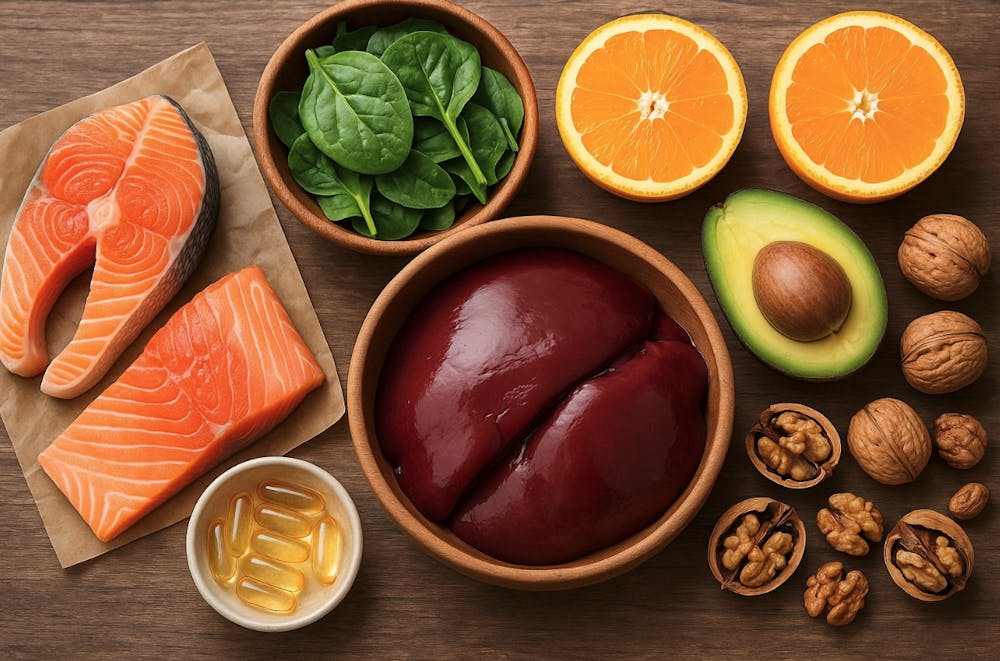The liver is one of the hardest-working organs in the body. It processes nutrients, filters toxins, stores energy, and helps break down fats, which are all essential functions for staying healthy. That said, the liver depends on a steady supply of key nutrients to do its job. Without them, its performance can decline, often without obvious symptoms at first.
Certain nutritional deficiencies have been directly linked to poor liver function, inflammation, and fat accumulation in the liver. As research continues to uncover the role of diet in metabolic health, attention has turned to specific nutrients that may help protect the liver from long-term damage. One of these is the C15 fatty acid, a type of odd-chain saturated fat currently being studied for its potential role in supporting liver and metabolic function.
This article outlines four of the most well-documented nutritional deficiencies that can negatively affect liver health and how to address them through diet.
1. Vitamin D Deficiency
Vitamin D plays a crucial role in immune regulation and inflammation control, both of which are directly tied to liver health. Low vitamin D levels have been associated with an increased risk of non-alcoholic fatty liver disease (NAFLD), a condition where excess fat builds up in liver cells, even in people who drink little to no alcohol. Some studies also link vitamin D deficiency to the progression of liver fibrosis, a more advanced stage of liver damage.
Many adults have insufficient vitamin D levels, especially those who live in areas with limited sunlight or who spend most of their time indoors. While the body can make vitamin D through sun exposure, dietary sources are also important, particularly in colder seasons. Foods such as fatty fish (like salmon or sardines), fortified dairy products, and egg yolks can help maintain adequate levels.
2. Choline Deficiency
Choline is a nutrient that often flies under the radar, but it plays a major role in liver metabolism. It helps transport fats out of the liver, prevents fat accumulation, and supports the structural integrity of cell membranes. When choline intake is too low, the liver may begin to store excess fat, increasing the risk of developing NAFLD.
In fact, choline deficiency is one of the few nutritional causes of fatty liver that has been demonstrated in both animal and human studies. This nutrient is considered “essential,” meaning the body can’t make enough of it on its own and must obtain it from food. Despite its importance, many people don’t meet the recommended intake.
Choline is found in high amounts in egg yolks, liver, lean meats, and certain legumes. Including these foods regularly can help maintain liver function and prevent fat buildup over time.
3. Zinc Deficiency
Zinc is a trace mineral involved in hundreds of biological processes, including enzyme activity, immune support, and antioxidant defense. In the liver, zinc contributes to detoxification, tissue repair, and inflammation control. When zinc levels are low, the liver may struggle to recover from damage and can become more vulnerable to oxidative stress.
Zinc deficiency is especially common in people with chronic liver disease or high alcohol consumption, but it can also occur due to poor diet or absorption issues. A lack of zinc has been linked to worsened outcomes in conditions such as hepatitis and cirrhosis, where the liver's ability to function is already compromised.
Dietary sources of zinc include oysters, beef, pumpkin seeds, lentils, and whole grains. Even small improvements in zinc intake may support liver repair and help reduce inflammation at the cellular level.
4. C15 Deficiency
C15:0 deficiency, also called Cellular Fragility Syndrome, is a condition characterized by an insufficient level of the essential fatty acid pentadecanoic acid (C15:0). C15:0 plays a critical role in maintaining cell membrane strength, mitochondrial function, and inflammation regulation. When the body lacks enough of this fatty acid, cells may become more fragile and less resilient, leading to reduced cellular stability and function.
Emerging research suggests that C15:0 is important for supporting metabolic health, mood balance, and overall cellular longevity. Individuals with C15:0 deficiency may experience symptoms tied to fatigue, brain fog, and immune challenges, among others.
Because the body cannot produce C15:0 on its own, it must be obtained through diet or through supplementation. While you can find trace amounts of C15 in whole-fat dairy and the brains of some fish, it is much healthier to rely on a supplement to sustain healthy levels.
Strengthen Your Liver from the Inside Out
The liver plays a central role in detoxification, energy regulation, and overall metabolic health, but it can’t do its job without the right nutrients. Deficiencies in vitamin D, choline, zinc, and C15 can quietly undermine liver function over time, even in the absence of immediate symptoms. While no single food or supplement can fix liver issues overnight, building a nutrient-rich diet can make a measurable difference.
This post is provided by a third party who may receive compensation from the products or services they mention.


